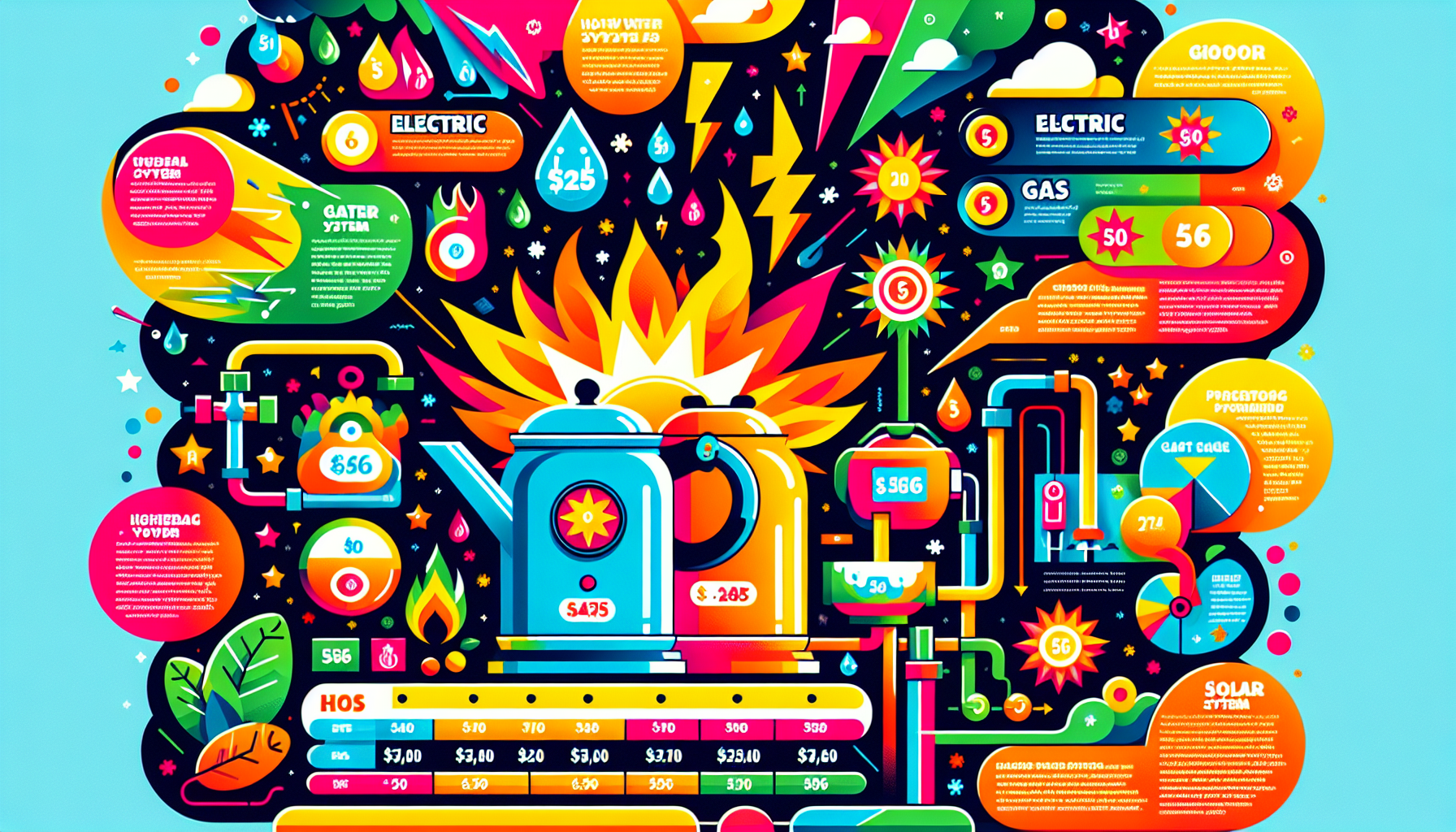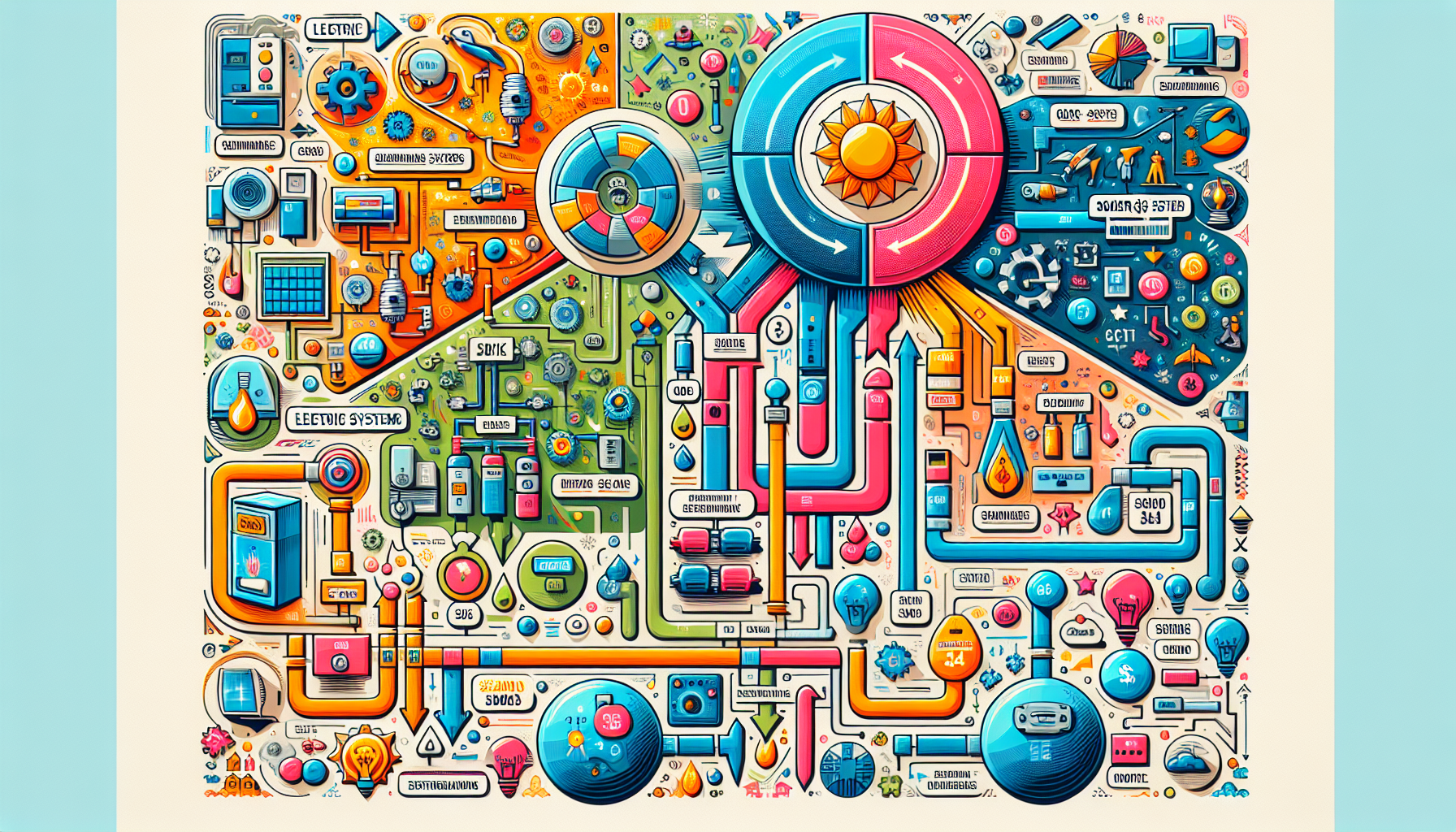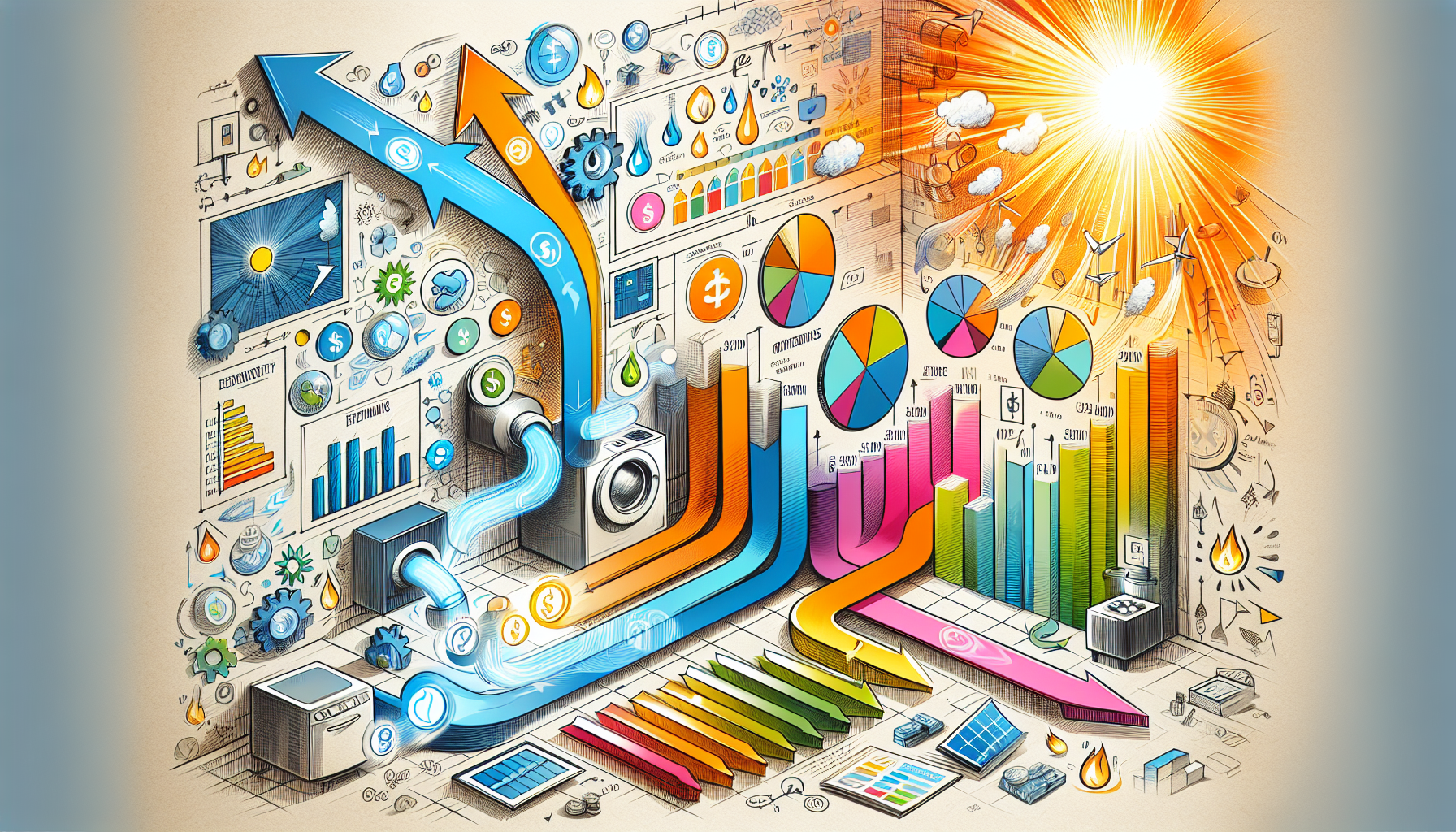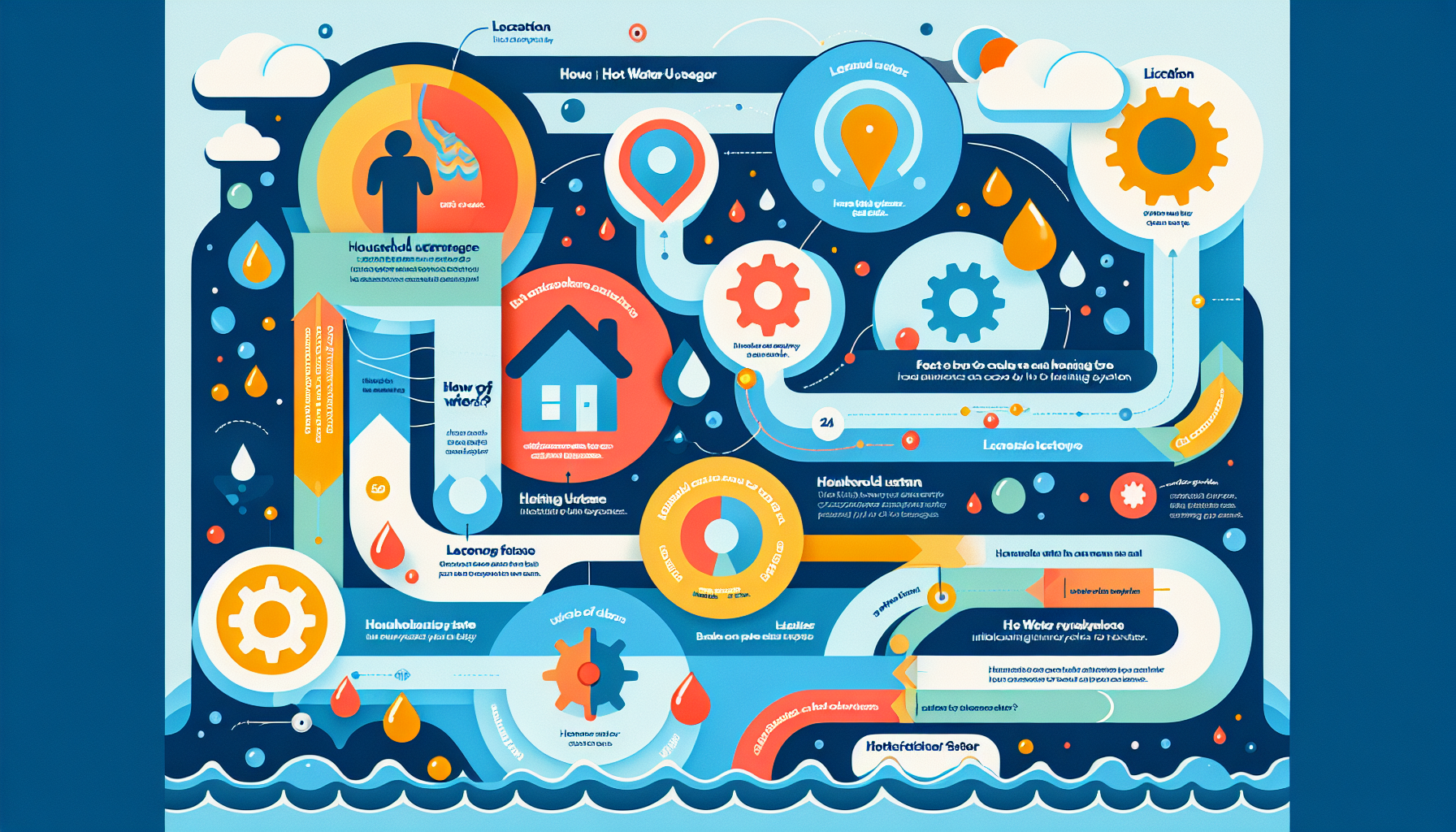Best Price of Hot Water System: Installation & Maintenance Guide
Looking for the price of hot water system options? This guide provides a clear overview of costs for electric, gas, solar, and heat pump systems, along with installation and maintenance expenses. Read on to make an informed decision for your home.
Key Takeaways
-
Hot water systems fall into four main categories: electric, gas, solar, and heat pump, each with varying upfront costs and energy efficiency.
-
Installation costs for hot water systems typically range from $1,000 to $7,000, influenced by factors like system type and installation complexity.
-
Regular maintenance is crucial for the efficiency and longevity of hot water systems, helping to avoid costly repairs and ensure optimal performance.
Types of Hot Water Systems and Their Prices

Selecting the right hot water system can be challenging due to the variety of options. These systems generally fall into four categories: electric, gas, solar, and heat pump. Each type offers unique benefits and price ranges, so understanding their differences is essential for making an informed choice.
Electric hot water systems, for instance, are known for their affordability, with prices ranging from $450 to $1,800 depending on the system type and installation. Gas hot water systems, on the other hand, offer versatility and can function even during power outages, with costs typically ranging between $700 and $1,900.
Solar hot water systems stand out for their energy efficiency and long-term savings, although they come with a higher initial investment, typically between $3,000 and $7,000. Heat pump systems, using advanced technology to extract heat from the air, provide an energy-efficient alternative with installation costs ranging from $2,500 to $4,000.
Knowing these price ranges and the specific advantages of each system is crucial for choosing the best hot water system for your home.
Electric Hot Water Systems
Electric hot water systems are a popular choice for both domestic and commercial settings due to their lower upfront costs. These systems generally range in price from $450 to $1,800, making them one of the more affordable options on the market.
There are two main types: storage systems, which heat and store water in an insulated tank, and continuous flow systems, which heat water on demand. Regular maintenance is minimal, further reducing long-term costs.
Ensuring the system is properly sized based on your household’s hot water usage will enhance efficiency and cost-effectiveness.
Gas Hot Water Systems
Gas hot water systems offer a balance between cost and efficiency, with prices ranging from $700 to $1,900. These systems are particularly versatile, capable of providing hot water even during power outages.
There are two main types: continuous flow systems, which heat water on demand, and storage tank systems, which store pre-heated water. Continuous flow systems are generally more energy-efficient, while storage tanks are cheaper to install but may incur higher running costs over time.
Solar Hot Water Systems
Solar hot water systems harness the power of the sun to heat water, offering significant long-term savings on energy bills. These systems are divided into passive and active types, with active systems using pumps to circulate water. While the initial investment is higher, usually between $3,000 and $7,000, the reduction in energy costs over time makes them a cost-effective option in the long run.
Factors like climate, system size, and household water usage will influence efficiency and savings.
Heat Pump Systems
Heat pump systems represent a highly energy-efficient option, using electricity to move heat from the air to heat water. These systems are known for their quiet operation and minimal maintenance requirements.
Despite higher initial costs of $2,500 to $4,000, their low running costs and high efficiency make heat pump systems a worthwhile long-term investment.
Installation Costs Breakdown

The installation cost of a hot water system is a significant part of the overall investment and can vary widely depending on several factors. Generally, installation costs range from $1,000 to $7,000, influenced by the type of system, brand, and the complexity of the installation process. Factors such as the design and layout of the installation area also play a crucial role in determining the final cost. Knowing these costs upfront helps in effective budgeting and avoiding unexpected expenses.
Consider all factors that could impact installation costs, such as the brand and type of system, specific installation requirements, and local labor rates. Breaking down these aspects provides a clearer picture of the true cost and aids in making an informed decision.
Electric System Installation Costs
Installing an electric hot water system typically costs between $1,000 and $2,000. These systems are often cheaper to install compared to gas systems, making them a popular choice for budget-conscious homeowners. The simplicity of the installation process further contributes to the lower costs.
Gas System Installation Costs
The installation costs for gas hot water systems generally range from $1,500 to $3,000. If there is no existing gas connection, this can add significantly to the overall cost. Despite the higher installation costs, gas systems offer benefits like lower running costs and reliability during power outages.
Solar System Installation Costs
Solar hot water systems require a substantial initial investment, with installation costs ranging between $3,000 and $7,000. Additional expenses, such as a backup gas or electric booster system, can add over $1,000 to the total cost.
Despite these costs, the long-term savings on energy bills make solar systems a worthwhile investment.
Heat Pump Installation Costs
Heat pump systems, known for their energy efficiency, have installation costs ranging from $2,500 to $5,500. Although the upfront costs are higher, the energy savings and lower running costs over time make them an attractive option.
Running Costs and Energy Efficiency

Running costs and energy efficiency are key considerations when selecting a hot water system. Electric hot water systems tend to have the highest running costs over time due to their significant electricity consumption. In contrast, solar hot water systems, especially those boosted by gas, offer the lowest running costs, providing substantial savings on energy bills in the long run.
Heat pump water heaters are another highly efficient option, being three times more efficient than traditional electric systems. Despite the higher initial costs, their low running costs, using only 30% of the energy compared to traditional electric systems, make them a cost-effective choice over time.
Expert consultation can offer valuable insights into energy efficiency and potential long-term savings.
Electric Hot Water System Running Costs
Electric hot water systems can result in higher energy bills due to significant electricity consumption. However, efficient use and off-peak tariffs can help manage these costs.
Over the long term, the operational costs can be influenced by fluctuations in electricity prices.
Gas Hot Water System Running Costs
Gas hot water systems typically have lower annual running costs compared to electric systems, with estimated energy costs ranging from $295 to $665 per year. These systems are generally cheaper to operate due to lower natural gas prices.
However, cold weather can increase hot water and cold water demand, leading to higher energy bills during winter months.
Solar Hot Water System Running Costs
Solar hot water systems offer significant long-term savings by utilizing sunlight to heat water, thereby reducing reliance on traditional energy sources. This can lead to lower monthly running costs and increased efficiency over time.
The long-term benefits of solar systems make them a highly cost-effective option.
Factors Influencing Hot Water System Costs

Several factors influence the costs associated with hot water systems, including installation fees, ongoing running costs, and maintenance expenses. The installation cost of a new hot water system generally falls between $1,000 and $7,000. Labour expenses for installing a hot water system typically range from $100 to $150 per hour, along with a call-out fee of $60 to $100. Regular maintenance ensures hot water systems operate efficiently and safely.
Choosing the ideal hot water system requires considering household size, energy consumption, initial investment, and ongoing costs. The right system should balance cost, efficiency, and personal preferences. Experts can offer tailored recommendations based on specific household requirements and clarify the cost implications of different systems.
Household Hot Water Usage
Household hot water usage plays a significant role in determining the most suitable hot water system. Daily hot water usage per person averages around 50 liters. Factors such as energy source, home size, and budget influence the choice of an energy-efficient hot water system.
For instance, instantaneous gas hot water systems are ideal for homes that do not receive much sunlight.
Location and Climate
Geographic location and climate conditions greatly impact the installation costs and energy efficiency of hot water systems. Areas with higher energy prices or extreme climates may require more efficient systems to manage costs effectively.
These factors guide the selection of a system that provides optimal performance and cost-efficiency for your location.
Government Incentives and Rebates
Government incentives and rebates can significantly reduce the overall cost of installing energy-efficient hot water systems. Many local governments offer financial incentives aimed at promoting the installation of these systems. Rebates often depend on meeting specific energy performance standards and can be applied even after emergency installations if eligibility criteria are met.
Incentives make energy-efficient systems more appealing to homeowners.
Maintenance Costs and Tips
Regular maintenance is critical to ensure the longevity and efficiency of hot water systems. Ignoring maintenance checks can lead to costly repairs or even the need for a complete replacement of the system. Routine maintenance not only enhances performance but also mitigates long-term costs associated with repairs and replacements. Proactive maintenance helps avoid unexpected breakdowns and ensures smooth operation of your hot water system.
Proper maintenance includes both professional servicing and DIY checks. Regular servicing extends the system’s lifespan and ensures peak efficiency, while simple DIY tasks can detect issues early, preventing minor problems from escalating.
Understanding common repairs and their costs can also help you budget for potential future expenses.
Regular Servicing
Regular servicing maximizes the efficiency and lifespan of hot water systems. For electric hot water systems, servicing every 2-3 years is recommended, though some manufacturers suggest annual servicing for optimal performance. Key components such as the heating element, thermostat, temperature relief valve, and sacrificial anode should be inspected and replaced as needed during servicing.
The cost of maintenance can vary based on the system’s age and condition, as well as the frequency of servicing.
DIY Maintenance Checks
Homeowners can perform several DIY maintenance checks to keep their hot water systems in good condition. Here are some important tasks to consider:
-
Check the temperature pressure relief valve every six months for safety.
-
Flush the hot water tank annually to remove accumulated sediment, improving efficiency.
-
Inspect for unusual water puddles around the unit to help identify leaks early.
By regularly performing these checks, you can ensure your hot water system remains in optimal condition.
These routine checks can enhance the system’s efficiency and reduce long-term service costs.
Common Repairs and Costs
Common issues with hot water systems include leaks, malfunctioning heating elements, and faulty thermostats. Extreme heat can cause thermal expansion in pipes, leading to leaks and cracks. Repair costs can vary, with replacing an electric hot water system ranging from $300 to $700.
Addressing these issues early can prevent more severe problems and higher repair costs in the future.
Choosing the Right Hot Water System

Choosing the right hot water system involves evaluating several factors, including household needs, costs, and personal preferences. Electric systems are usually the cheapest upfront, while gas systems are mid-range, and solar systems have higher initial costs but offer long-term savings. Understanding these differences can help you make an informed decision that balances initial investment with long-term benefits.
Assessing your household’s hot water usage and comparing long-term costs are crucial steps in this process. Consulting specialists can provide tailored advice and accurate cost estimates, ensuring you choose a system that meets your specific needs. By considering both upfront and ongoing costs, you can select a system that offers the best value over time.
Assessing Your Needs
Evaluating your household requirements is key to selecting the most suitable hot water system. For larger households of 5-8 members, a tank size of 250L is necessary for low usage, while 400L is recommended for high usage. Medium-sized households typically consist of 3 to 6 individuals. For low usage, a 160L tank should suffice, while high usage would require a 315L tank.
This assessment ensures that the system you choose can efficiently meet your family’s hot water demand.
Comparing Long-Term Costs
When evaluating different hot water systems, it’s crucial to estimate both upfront and annual operating costs for long-term financial planning. While electric systems may have lower initial costs, their higher running costs can add up over time. Conversely, solar systems, despite their higher upfront costs, offer significant savings in the long run due to lower energy bills.
Considering these factors can help you choose a system that offers the best value over its lifespan.
Consulting Specialists
Experienced specialists can help estimate long-term costs and select the right system. They offer tailored recommendations based on household needs and specific system options, providing accurate cost estimates for better budgeting of installations and maintenance.
Summary
In summary, choosing the right hot water system involves understanding the different types available, their installation and running costs, and the factors influencing these costs. Regular maintenance is crucial for efficiency and longevity, and considering both upfront and long-term costs can help you make an informed decision. By following this guide, you can ensure that you select a hot water system that meets your household’s needs and offers the best value over time. Remember, consulting specialists and taking advantage of government incentives can further optimize your investment.
Frequently Asked Questions
What are the main types of hot water systems?
The main types of hot water systems are electric, gas, solar, and heat pump systems. Each option offers distinct advantages depending on your energy source and efficiency needs.
How much does it cost to install a hot water system?
The cost to install a hot water system typically ranges from $1,000 to $7,000, influenced by the type of system and installation complexity. It's essential to assess your specific needs to determine the final cost.
Which hot water system has the lowest running costs?
Solar hot water systems typically have the lowest running costs because they utilize renewable solar energy, reducing dependence on electricity or gas. This makes them a cost-effective choice over time.
How often should I service my hot water system?
To ensure optimal performance, you should service your hot water system annually. For electric systems, servicing every 2-3 years is sufficient.
Are there government incentives for installing energy-efficient hot water systems?
Yes, many local governments provide rebates and financial incentives for installing energy-efficient hot water systems, making it a financially beneficial choice.

























